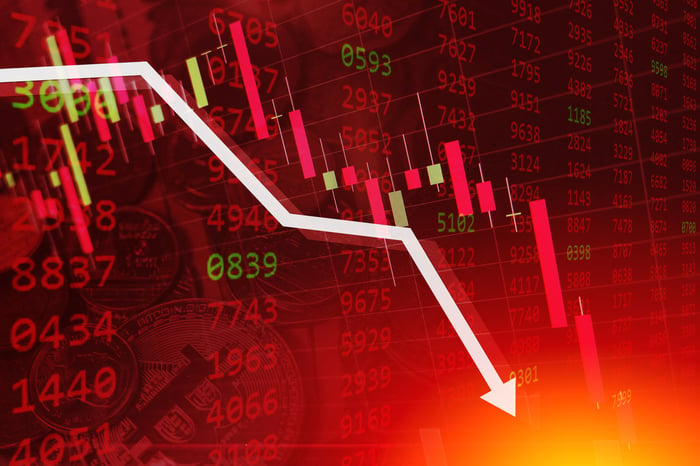We're nearly at the halfway mark of 2023, and already the Nasdaq Composite has put up a banner year. The tech-heavy index is up 25%, reclaiming about half of last year's losses.
However, not every Nasdaq stock was a winner in May, even though it was the month in which the tech sector rallied following a blowout earnings report from AI chipmaker Nvidia.
Let's look at the three worst performers from the Nasdaq 100 -- an index that monitors the performance of the 100 largest stocks in the Nasdaq Composite -- in May to see if any of them are worth buying.

Image source: Getty Images.
1. PayPal (down 18.4%)
PayPal (PYPL 0.08%) was the worst performer on the Nasdaq 100, largely because the digital payments leader is facing challenges on multiple fronts. It's losing market share to Apple, which has parlayed its installed base of over 1 billion devices into a powerful platform for Apple Pay. Like much of the fintech sector, PayPal is also struggling with the macroeconomic realities as consumer spending has weakened and online spending has faded following the boom during the pandemic.
CEO Dan Schulman said he's stepping down at the end of the year, but the company has yet to name a successor. To shore up its profitability, the company also said it would lay off 7% of its staff in January.
Last month, PayPal's stock tumbled on its first-quarter earnings report even though it beat estimates on the top and bottom lines and raised its guidance. However, investors were concerned that the company dialed back its operating margin guidance as unbranded transaction growth outpaced branded transactions in PayPal's legacy business. Braintree, which helps businesses accept digital payments, drove growth in its unbranded segment.
After last month's sell-off, PayPal stock trades at just 13 times this year's expected adjusted earnings, which looks like a great price to pay for this leading fintech stock.
2. Warner Bros. Discovery (down 17.1%)
Warner Bros. Discovery's (WBD 0.43%) troubles continued last month as the media stock delivered a middling earnings report, and the stock swooned in the second half of the month as the ongoing writers' strike added to the company's challenges, which include a weakening ad market.
Revenue in the quarter was down 5% year over year to $10.7 billion, and it posted a net loss of $1.1 billion. Its streaming segment did report a small $50 million profit on the basis of adjusted earnings before interest, taxes, depreciation, and amortization (EBITDA). That's a sign it's making some progress on cutting costs, though it's clear the company has more work to do.
In the second half of the month, the stock slipped with much of the media industry on concerns that the writers' strike could drag out, affecting the pipeline of new content Warner Bros. Discovery and its peers rely on to attract users to its networks and streaming services. The company will also probably have to pay its writers more once the strike ends.
WBD also launched its new Max streaming service, which combines HBO Max and Discovery+, though some critics have questioned the wisdom of eliminating the HBO brand from the title.
With the writers' strike lingering, weakness in the ad market, intense competition in streaming, and nearly $50 billion in debt on the balance sheet, the stock could have even further to fall.
3. Starbucks (down 14.6%)
Rounding out the list was Starbucks (SBUX 0.07%), which also posted a solid earnings report last month, but the stock fell as the company declined to raise its guidance for the full year, indicating that it's cautious about the rest of the fiscal year.
Fiscal second-quarter numbers were solid, with revenue up 14% year over year to $8.7 billion as comparable sales rose 11% globally, including a 12% jump in North America and a 3% rise in China.
Starbucks seemed to benefit from the reopening in China and lapping the peak of the COVID-19 omicron variant in the United States.
The company is targeting 15%-20% EPS growth in 2023, for a range of $3.41-$3.55.
The stock drifted lower in the second half of the month on weakness in the retail sector as investors fear declining demand for discretionary goods, but the sell-off could be a buying opportunity for Starbucks as the business looks to be on stable footing following the pandemic disruption.





